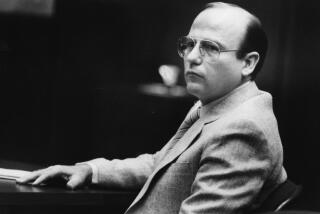Portrait of a Whistle-Blower
- Share via
As soon as I saw him approach, I recognized him as Robert Inouye, the whistle-blower I had arranged to meet.
He was a fit-looking man in his 50s, wearing a sharp, gray Windbreaker. What confirmed his identity to me was the packet of documents and other papers he carried, the whistle-blowers’ burden. Whistle-blowers don’t seem to go anywhere without their documents.
As we shook hands, I looked him over with a good deal of interest. I could see Inouye wasn’t the usual whistle-blower, ground down by years of having corruption charges ignored.
For one thing, Inouye had won. Just 10 days before, a Los Angeles Superior Court jury had voted 9 to 3 to award him a $518,000 judgment from the people who had fired him for his whistle-blowing, the powerful bureaucrats in charge of our bus and rail commuter lines. He got $418,000 for lost earnings and $100,000 for emotional distress.
By 9 a.m. on Monday, the early morning power breakfasters had left Junior’s, a Westside deli. We found a table, ordered salami and eggs, and Inouye began to tell me his story.
*
In 1989, he was a contracts compliance officer for the Los Angeles County Transportation Commission, a predecessor of the present Metropolitan Transportation Authority. Contractors complained to him that others in the construction business were breaking the law. Inouye investigated and said he found that transit officials had steered contracts to a friend of then-Mayor Tom Bradley. He said they had engaged in other incompetent and corrupt behavior.
He went to his boss, Neil Peterson, the head of agency. “I realized it was a hot potato,” Inouye said. So he advised Peterson to hire an outside counsel to conduct the investigation.
But instead of following Inouye’s advice, county transportation officials said there was nothing to Inouye’s charges. Inouye complained to members of the County Transportation Commission. They urged him to push ahead. He turned his allegations over to the district attorney’s office. Dist. Atty. Ira Reiner’s chief of investigations, Jack White, said he discovered “evidence of administrative bungling” but “didn’t find any criminal wrongdoing.”
The next development is the sort of thing that gives second thoughts to anyone contemplating whistle-blowing. The D.A.’s office, in reporting the administrative bungling to Transportation Commission Director Peterson, also revealed Inouye as the tale-teller.
You might call this the exact opposite of a witness protection program. Not too long after that, Inouye’s job was eliminated. He said he applied for five other jobs in the transportation agency but got none of them. The father of two teen-agers, Inouye was unemployed.
By now, he understood that L.A. County’s political establishment was stacked against him.
And the strain was getting to his family. He wiped tears from his eyes, remembering how difficult it was. “Who understands the inner workings of these organizations, the inner sanctums?” he said. “(People) thought, ‘There must be something wrong with you.’ My wife was concerned about the effect it would have on our relations with everyone else. We pretty well have cut off our relations with other family members. . . . It’s very difficult because the children don’t understand what’s happening in this world of sleaze. They have suffered through the entire process.”
But in his earliest childhood, Inouye learned something about not being pushed around. When he was 1 year old, he and the rest of his family were transported with other Japanese Americans from their Boyle Heights home to the Tule Lake internment camp, near the California-Oregon border. His father, an American-born graduate of Roosevelt High School, lost his bicycle and motorcycle repair shop in the process.
“It was a camp where those who questioned authority went to, those who questioned the authority of the government’s denial of their rights. I recall prison guards shot at the ground. . . . I recall being in the communal latrine with a man lying on the floor with blood all over his back, guards coming over, kicking people away.”
When World War II ended, Inouye and his family settled in Sunland, and he became a conventional product of the ‘50s Silent Generation--North Hollywood High, Army service in Cold War Berlin, Cal State Northridge, a government job. But the rebelliousness perhaps inspired by Tule Lake surfaced. Inouye hired himself a lawyer and continued the fight.
*
The story isn’t over.
Inouye wants his job back. The MTA refuses to do that and may also appeal the judgment, tying Inouye up in the courts for years.
But he may have the last word. Federal authorities are investigating MTA operations, including subway construction. Inouye has told his story to the feds.
Of course, he brought along a box of documents.
More to Read
Sign up for Essential California
The most important California stories and recommendations in your inbox every morning.
You may occasionally receive promotional content from the Los Angeles Times.













